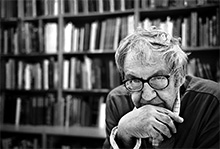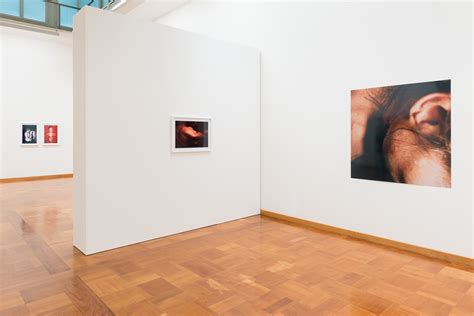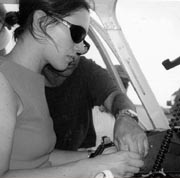A Quote by Paul Rusconi
I never had any intention nor interest in being an artist, but when I made work I realized that this was my language. What I had to say needed to be said in this way. I always loved taking photographs - but never considered myself a photographer. I have tremendous respect for photographers. I do use a camera and a photo as a basis for a lot of my work, but I use it as a means to attain an image to work from. The actual photography in my work is a monochromatic photograph. I'll photograph something and extract a color that will then be the background for a painting.
Quote Topics
Actual
Always
Any
Artist
Attain
Background
Basis
Being
Being An Artist
Camera
Color
Considered
Extract
Had
His Way
I Realized
Image
Intention
Interest
Language
Lot
Loved
Made
Means
Monochromatic
Myself
Needed
Never
Nor
Painting
Photo
Photograph
Photographer
Photographers
Photographs
Photography
Realized
Respect
Said
Say
Something
Taking
Then
Tremendous
Use
Way
Will
Work
Related Quotes
I work in several different groups of pictures which act on and with each other - ranging from several abstracted manners to a form for the surreal. I have been called a preacher - but, in reality, I'm more generally philosophical. I have never made an abstracted photograph without content. An educated background in Zen influences all of my photographs. It has been said that my work resembles, more closely than any photographer, Le Douanier Rousseau - working in a fairly isolated area and feeding mostly on myself - I feel that I am a primitive photographer.
I've never been the type of photographer to live with people I photograph. You know, shoot heroin with them, that kind of thing. I respect those photographers that work that way. But part of my personality is a certain amount of distance, and part of my attraction to the medium of photography is this distance where you're in the world, but you're removed from it.
My approach to photograph is kept simple, almost routine. All work, good and bad, is documented. I use standard film, a standard lens and no filters. Each work grows, strays, decays-integral parts of a cycle which the photograph shows at its height, marking the moment when the work is most alive. There is an intensity about a work at its peak that I hope is expresses in the image. Process and decay are implicit.
I think I’ve said this before many times—that photography allows you to learn to look and see. You begin to see things you had never paid any attention to. And as you photograph, one of the benefits is that the world becomes a much richer, juicier, visual place. Sometimes it is almost unbearable — it is too interesting. And it isn’t always just the photos you take that matters. It is looking at the world and seeing things that you never photograph that could be photographs if you had the energy to keep taking pictures every second of your life.
Now everyone's main objective of taking photographs is to have a photograph for Twitter or Facebook. I find that troubling. If you have an opportunity to meet the Dalai Lama, don't work out your camera or iPhone issues. Sit and a listen to what the man is saying, because nine times out of 10, you're not going to look at that photo. You're not going to look at the video. As a photographer, I don't carry a camera. I have my iPhone, but I don't carry a camera. I want to live.
I have much respect for the people that I work with, and it's reciprocal. My shoots are always very calm. Everyone has their work to do, and we try to respect everyone's work and give them the time necessary. There's never any tension. That's something that helps to attain the simplicity that I'm looking for.
[When] I am taking a photograph, I am conscious that I am constructing images rather than taking snapshots. Since I do not take rapid photographs it is in this respect like a painting which takes a long time where you are very aware of what you are doing in the process. Exposure is only the final act of making the image as a photograph.
I love to work, and to make all kinds of work. But if I work on a fashion story then I work for somebody. If I work for me, for an art project, then I'm not that nervous. It doesn't matter when the photo is done. And if I work on a fashion shoot, then I have access to all these things that I can use later for my art - a still life here or there. I can do all of this while the model is changing.
It's always an interesting thing that happens between an artist and their work. People collapse the two, and for any artist, there will be a long period of being considered one thing before being considered another - whether despicable, rhetorical, or poetic. But we all know that these things are made with a huge amount of will and intention. Yet ultimately they're out of our control.
I was always interested in drawing and painting. I enrolled in college to study painting. But I didn't have any livelihood when I graduated. My mother died very young, and I didn't have any home, so I had to find a way to earn a living. It seemed to me that photography - to the great disappointment, I have to say, of my painting teacher - could offer that. So I went and did a degree in photography, and then after that I could go out and get paid for work. For portraits, things like that.
I had to leave some traces. In the beginning, I would give complete instructions to the photographer. In the '70s, people would come to photograph your work and you would just end up with this crazy material that had nothing to do with your work; maybe I'd pick up two or three photographs that were the closest to the idea. This is why when you look at the '70s, you see much less documentation and really bad material. The material will become misleading to what the piece was.
But there is more to a fine photograph than information. We are also seeking to present an image that arouses the curiosity of the viewer or that, best of all, provokes the viewer to think-to ask a question or simply to gaze in thoughtful wonder. We know that photographs inform people. We also know that photographs move people. The photograph that does both is the one we want to see and make. It is the kind of picture that makes you want to pick up your own camera again and go to work.
I was always telling myself I could handle a more complex role, I could handle something bigger and more interesting than the work I was doing. But I wasn't demanding that of myself. At a certain point, I realized it was never going to come my way unless I started taking more control of it. That's what I realized I had to do.

































